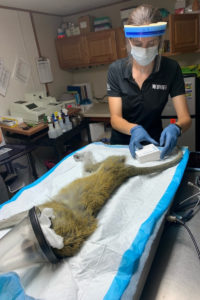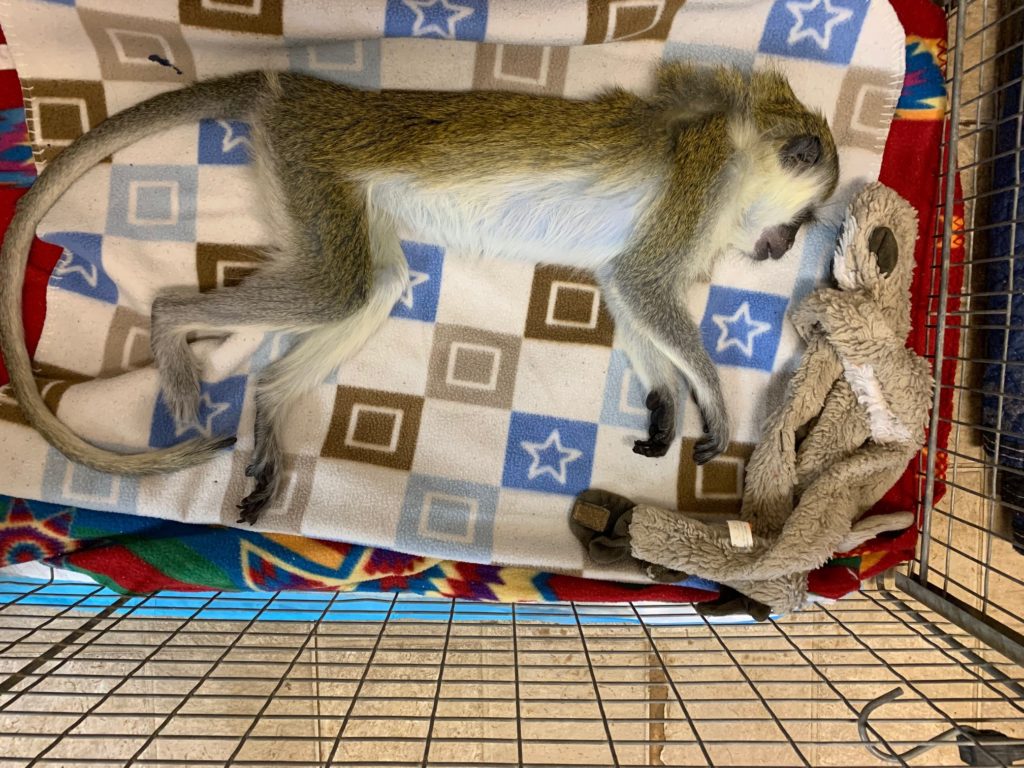One of the challenges in caring for monkeys is that primate medicine and veterinary care is a complex and little-practiced science. We are extremely lucky to have our expert vet, Dr. Katie Jennings, and Veterinary Technician, Sarah Lampl, on hand at the sanctuary to deal with any medical issues that come up, however the lack of primate vet experience nationally means that animals arriving with us may have never seen a vet before in their lives. If their former owners did provide them with vet care, which is unusual, health issues can go unnoticed as even experienced vets do not necessarily know how to diagnose and treat monkeys.
Kiki had been seen by a vet twice in her life and her former owner told us that she was largely healthy, albeit quite thin. She had no medical records so, despite these assurances, we were starting from scratch.
The first step in Kiki’s health journey was to give her a thorough health check and test her for any illnesses that might impact her, other monkeys, or our staff, which means drawing bloods and sending them away for testing.

Unlike dogs and cats who, dependent on their temperament, might allow a vet to handle them, check their teeth and body condition, and even draw blood, without sedation, we can never carry out such checks on a monkey without risking their safety and that of our team. As wild animals, subjecting them to restraint or handling without sedation is both dangerous to us and extremely stressful for them. Even the smallest of monkeys can deliver a nasty bite or scratch and the risk of potential zoonotic disease spread is high, however minor a bite or scratch may be. With this in mind, Kiki was sedated for her exam to keep her and everyone else safe.
During exam, we found that she was more underweight that we had initially thought – her long fur was hiding a tiny frame. We could feel every rib and bone of her spine. We knew then that our first task would be to get her up to a healthy weight. Her coat was somewhat dry, which points again to a need for better nutrition, and she had some bald patches where the harness that she had worn had rubbed. The first thing we did was release her from her harness, which she will never have to wear again.
Her initial blood tests showed that she was mildly anemic and that she was suffering from chronic stress. Neither of these results are surprising as poor nutrition and high stress levels are common in new arrivals, particularly those who have been kept as “pets.” This isn’t to suggest that Kiki’s former owner deliberately neglected or was cruel to here – in fact the family very much loved her – it is that the very circumstance of being kept in such an unnatural environment without others of her own kind is fundamentally stressful for monkeys.
A full set of bloods were then sent off for more thorough testing than we can do in our small clinic. This marked the beginning of Kiki’s two-week quarantine period.
Her initial blood tests showed that she was mildly anemic and that she was suffering from chronic stress. Neither of these results are surprising as poor nutrition and high stress levels are common in new arrivals, particularly those who have been kept as “pets.”
After her exam, Kiki was closely monitored as she came round from sedation. Like humans, monkeys can be a little wobbly and somewhat ‘drunk’ for an hour or so after exam as the drugs flush through their systems. We ensure that all monkeys are closely monitored until they are alert and can sit up and fully support themselves. We then leave them in a quiet and calm space to fully recover, checking on them regular over a number of hours. Once we are happy they are back to their normal selves, we put them back out into their normal living space to get on with their day.

In the last few days, we received all Kiki’s results back. Beyond some anomalies in her liver function, which we are exploring further, the tests did not throw up anything else of immediate concern. This means that, in the coming weeks, Kiki can begin the transition from her quarantine quarters to move alongside our existing vervet group. From there, she will begin the slow process of socialization and making friends. We cannot wait to see her finally able to interact fully with monkeys just like her. We will, of course, keep you updated!
For the Monkeys,
Liz
You can support Kiki’s medical care – and ensure she has the nutritious food she needs to gain weight and strength and enrichment to keep her engaged and happy, and support our efforts to socialize her with other vervet monkeys – by adopting Kiki!
